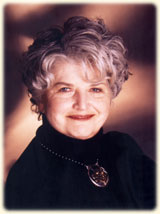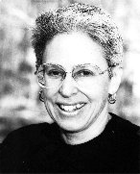Editorials
The views and opinions expressed on
this page are solely those of the contributor. Neither the Editor of
this magazine, nor the editorial staff, are responsible for the
content. The Editor has allowed glbt voices to be expressed
here on current political and social issues for the purpose of dialog
and debate. Please email the contributor if you wish to discuss the
issues further. Emails taking the editor to task for the viewpoints
expressed here will not be answered but relayed to the contributor of
the editorial for any reply...
  My Two
Cents on Same-Sex Marriage My Two
Cents on Same-Sex MarriageBy Patricia Nell Warren Between the California court decision and violent Congressional reactions to same, America is exploding over same-sex marriage. That includes those in the GLBT world who oppose SSM. Recently an old-time activist commented angrily to an email list: "The push for same-sex marriage shows how far the gay/lez movement has strayed from its vision of sexual freedom for all." A look at our own history proves this "vision" was NOT shared by all. Way back in 1973, when I wrote The Front Runner and came out, there was already a significant difference of opinions...a percentage of our people who wanted the right to marry. In the GLBT press, marriage was already an issue -- especially in the new church movements like MCC, Dignity, etc. These debates prompted me to weave a same-sex marriage thread into the Front Runner storyline, because my two main characters were among those who would value it. Readers of IGW who were around in those days will recall a related debate about having children. Some gay activists utterly loathed the idea of having children! And they fiercely opposed the idea of other GLBTs having children as well. When The Front Runner was published in 1974, there were people who got in my face saying they loved most of the book...and they hated the part about the lesbian who had a baby by artificial insemination. But the GLBT family movement gathered force like a tidal wave -- today such births are commonplace in our world, and thousands of same-sex couples resort to adoptions and fostering to have children in their lives. Result: the "community" split on marriage and family is an old one, with some insisting that they have no interest in an institution so abused by straight people. As a refugee of heterosexual marriage (I divorced my husband in 1973, when I came out), I agree that marriage badly needs a major cleaning up! BUT I also think it's normal and natural for many human beings -- regardless of their culture or sexual orientation -- to surround their most cherished relationships with ceremony, parameters, agreement on property, etc. It's HUMAN to want this. Marriage has been around for 10,000 years because it's a HUMAN thing, not a heterosexual thing. Often in the ancient Roman pagan world, gay people got married under Roman civil law, and surrounded themselves with the appropriate festivities involving Goddesses and Gods. In medieval times, according to gay historian John Boswell, pairs of men and women were still getting hitched in touching commitment ceremonies that were written down. Bottom line: the institution of civil marriage should be there for those who want the legal and social protections. Those who hunger for the bonus of a church nuptial or spiritual commitment ceremony can find an open-minded church somewhere, or create their own ceremony. Those who don't want any part of marriage are free to avoid it like the plague. The sad thing is -- many GLBT opponents of marriage do what the religious right do -- they tell other people how to live. They talk like the religious righters who go around whining that their own lives are demeaned because two homos get hitched. They even actively campaign against the civil-rights efforts of their own brothers and sisters who seek the right to marry. In my opinion, that makes them as autocratic as the religious right. This autocratic streak in some of our activists is something we ought to worry about. GLBT opponents of marriage have created a few myths that should be punctured: Myth #1: we're losing civil-rights ground because we asked for marriage. Not so. The religious right would want us gone from Planet Earth even if we didn't ask for marriage. They don't like us, period. As a friend of mine said, "We can't jump high enough for the religious right." Myth #2: the SSM crusade is harming non-married straights, by causing a reaction that denies rights to all non-marrieds as well. Wrong again. For many decades various states have been narrowing their recognition of common-law marriage -- a movement that got underway long before same-sex marriage exploded into controversy. Likewise the government's tax penalties on singles have pre-dated the SSM movement by quite a bit. The U.S. has long favored giving weightier rights and perks to marrieds, especially those with children, simply because we are a conservative religion-based country, and conservative religion-based countries tend to encourage their people to marry and have children. Myth #3: marriage is an invention of conservative heterosexism. Not so. Civil marriage (which is what we're asking for) is an ancient Roman institution. In imperial Rome, same-sex marriages were sometimes performed, and were viewed as legal. Since then, civil marriage has a fascinating and sometimes radical history. During the Protestant Reformation, it re-emerged as a way for religious dissidents and freethinkers to escape the despotic controls of imperial Catholicism, which required all marriages to be performed by a priest. Today the real history of civil marriage can lead to this conclusion: benefits of civil marriage should be available to all classes of persons that reasonably qualify. And those classes -- according to that California judge who found the state's marriage ban unconstitutional -- should "rationally" include us. By the way, a disclosure: I have no personal agenda here -- no interest in getting married. Once was enough for me! ___________________ Warren discusses the fascinating and significant history of civil marriage in depth for the next issue of Gay & Lesbian Review. Her editorials and commentaries, as well as help writings for authors and publishers, are archived at www.patricianellwarren.com. Email her at patriciawarren@aol.com. Copyright (c) 2005 by Patricia Nell Warren. All rights reserved |
  I
Want To Go To My Daughter's Wedding I
Want To Go To My Daughter's WeddingRochelle Hollander Schwab © Copyright 2005 http://www.rochelleschwab.com/ rochelleschwab@comcast.net I want to go to my daughter's wedding. My younger daughter is 37. I thought she'd never be ready to marry, but, finally, she's found her soulmate. The two of them share a cozy rambler, filled with family photos and gourmet cookbooks. Together they grow vegetables, create salads and casseroles, walk the dog. Together they've decided they are tired of just living together. They're ready to "tie the knot." This daughter dislikes formality. It's unlikely she'll be married in a satin gown; a simple suit is more her style. But her dress isn't important. What is important, she says, is "a personal, beautiful celebration of our love." I want to go to that celebration. So does my husband, our older daughter, son-in-law and grandchildren. We all want to go to her wedding. But we can't -- because the warm and caring person she chose to share her life with is also a woman. I don't understand. They live together. They love each other. Why can't they get married? Opponents of same-sex marriage say it's because marriage is for procreation. Yet my father and stepmother married when they were too old to have children. Why could they marry, while my gay nephew and his partner --parents of an adopted baby boy -- can't? Foes say they're protecting marriage. I don't see how my daughter, Jill, and her partner, Pam, threaten anyone's marriage. Would their married neighbors head for divorce court if Jill and Pam had a wedding photo on their dresser? Marriage is a sacrament, the religious right argues. But same-sex couples just want the right to have a legal, civil ceremony. Churches, mosques and synagogues could still refuse to marry anyone but one man and one woman. Still, many liberal churches and Jewish congregations do wed same-sex couples. Jill and Pam could be married by the rabbi of our humanist Jewish congregation. But Jill and Pam want legal recognition. They want the assurance that if one of them ends up in intensive care, the other won't be turned away when she visits. My nephew and his partner need those protections too, especially now that they have little Sean. What if something happens to one of them, and his other father has no legal connection to his son? I tell Jill she and Pam can get married legally this summer, in Massachusetts. But, she says, besides family, they want "our friends around us too." And their friends are in the university town in Oregon where they live. I can't argue with that. Our older daughter and son-in-law also chose to marry where their friends were. Jill emails that she and Pam applied for a marriage license at their county courthouse, but were turned away. I think of the Sixties. A college friend was afraid to visit our Virginia home because she is black and her husband was white. She had good reason. Only a few years earlier the state of Virginia had thrown mixed-race couples in jail for the crime of marrying across the color line. On TV I see hundreds of couples, like my daughter and her partner, standing in the rain waiting to marry in San Francisco. I know even some gay rights advocates are telling them this isn't the right time. I remember that same advice was given to the four black college students who staged the first lunch counter sit-in in 1960. There were more urgent issues, voting rights for one. Eating places did serve blacks at a rear window. What difference did it make where you ate? What difference? Ask the man who's told he's not good enough to sit with the rest of the customers. Ask the woman who's told she's not good enough to marry. Jill calls with news. Portland, Oregon, two hours from her home, is issuing licenses to same-sex couples. She and Pam wonder if they should take off from work and rush to Portland. Or maybe, she continues, they should go back to their own county courthouse. If the county attorney in Multnomah County says discrimination is against Oregon law, why should discrimination be legal in their own, neighboring county? I wish her good luck. There's a new civil rights movement starting, and she and Pam are on the front lines. Then I shudder, remembering elected officials standing in school house doors to keep black children out, and police greeting civil rights marchers with fire hoses. Today it's the President of the United States, trying to amend the Constitution to deny my daughter equal rights. I'm proud of Jill and Pam for being part of this new movement. But I wish it wasn't necessary. I wish they could just set a wedding date. Because all I want is to go to my daughter's wedding. Rochell Schwab is the author of A DEPARTURE FROM THE SCRIPT, winner of the Lambda Literary Foundation's Self-Published Book Award (women's books) It's a novel about a Jewish mother who helps her daughter plan a traditional Jewish lesbian wedding. What's more, she's doing it behind her husband's back! If that isn't enough tsuris -- Yiddish for aggravation -- for one person, then what is she to make of her own new infatuation with a striking lesbian artist? |